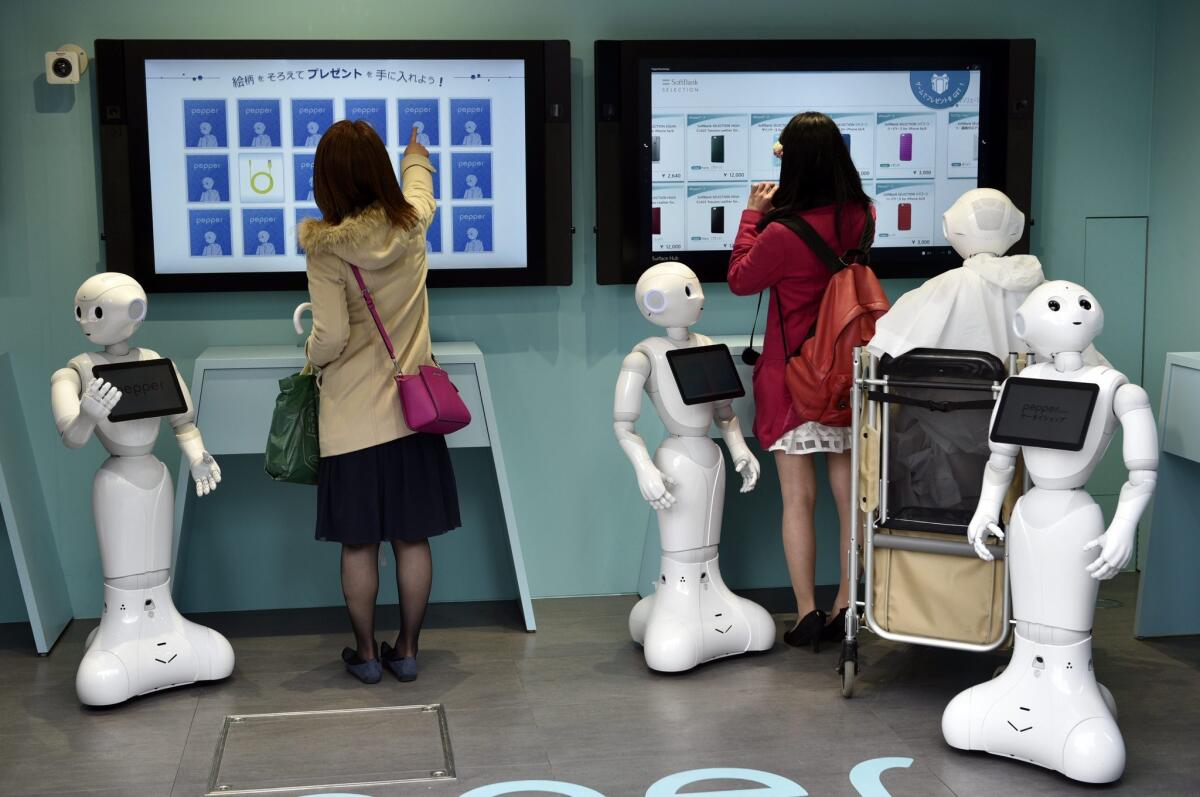Readers React: Is a brave new world of robot workers at hand? Maybe not

Two women visit a newly opened robot-staffed store run by telecommunications and mobile phone carrier SoftBank Corp. in Tokyo, Japan on March 24.
- Share via
Warning bells sounded this week as The Times published “Robots are coming for your job.” The opinion piece predicts: “Human workers of all stripes pound the table claiming desperately that they’re irreplaceable. Bus drivers. Bartenders. Financial advisors. Speechwriters. Firefighters. Umpires. Even doctors and surgeons. Meanwhile, corporations and investors are spending billions toward making all those jobs replaceable.”
Wait a minute, chorused our letter writers, not so fast. It’s a little more complex, to your minds. Among the considerations:
—Sara Lessley, Letters to the Editor department
As Louis Race of Los Angeles observed:
Part of the problem is that robots and machines are terrific workers but lousy customers. They’ll labor tirelessly to produce Fitbits, T-shirts, automobiles and toasters, but with no need (much less desire) to possess any of them.
Meanwhile, Henry Ford’s concept that workers should be paid enough to be the consumers of what they produce is becoming laughably obsolete, as we hurtle toward a future in which machines make what they don’t need and people need what they can’t afford. Pretty picture, isn’t it?
Yes, adds Steven Felschundneff of Claremont:
Bryan Dean Wright’s Op-Ed on job-killing robots says, “Robots and computers don’t need healthcare, pensions, vacation days or even salaries.”
Which all seems pretty appealing to business, until you consider that robots also don’t need smartphones, automobiles or homes in the suburbs.
Without workers, who will buy the products made during the fourth industrial revolution?
Seems that a finite number of jobs can be eliminated before demand drops to the point at which the economy simply collapses.
Ed Salisbury of Ontario is less alarmed:
If you tell a boy or girl that in the future, unskilled labor will be performed by robots, it is unlikely to cause anxiety on their part.
The author’s extrapolation that robots and artificial intelligence will reduce skilled jobs is a stretch — automation is increasingly integrated into many sectors of the economy, with resulting growth and productivity in these sectors.
Things have value because we say they have value, and economic growth results from creating value in the world. When we as a society decide that education, sustainability and related sectors are valuable, these sectors will be the source of economic growth, and the jobs will follow.
And Sal Tarantino of San Diego sees a bigger issue:
The real question for our society is not whether more people will become unemployed as a result of automation. They will.
The real question is how do we equitably distribute wealth when the traditional method — work — is increasingly unavailable?
The danger in the long run from this unequal distribution of wealth is that it will destroy our democratic society. I keep waiting for our national political leaders to begin debating this issue.
Follow the Opinion section on Twitter @latimesopinion and Facebook
More to Read
A cure for the common opinion
Get thought-provoking perspectives with our weekly newsletter.
You may occasionally receive promotional content from the Los Angeles Times.









